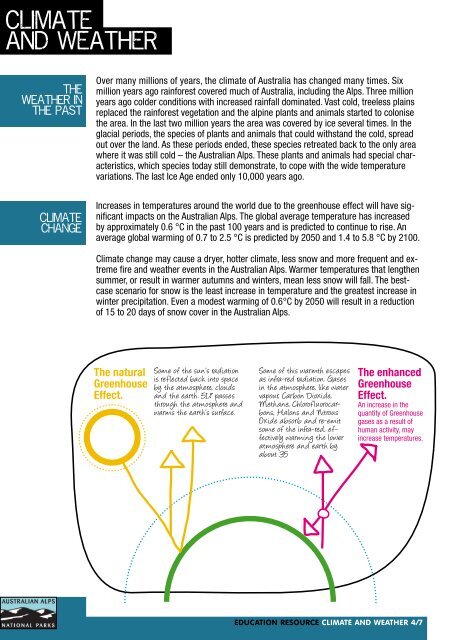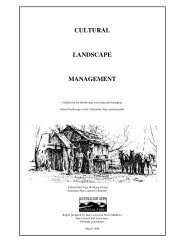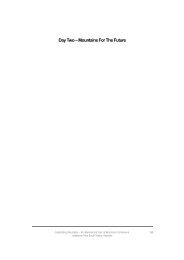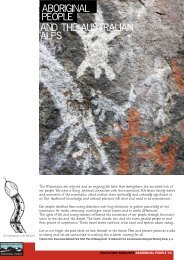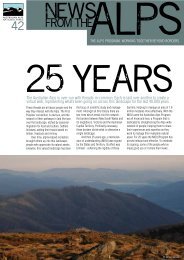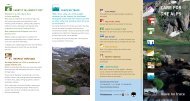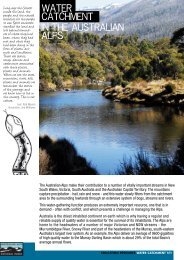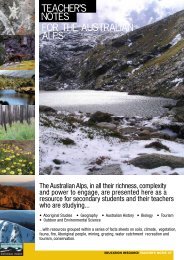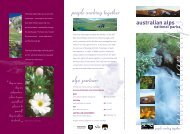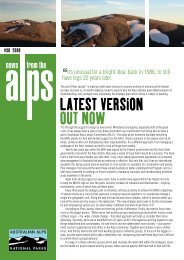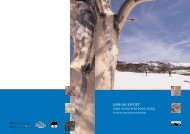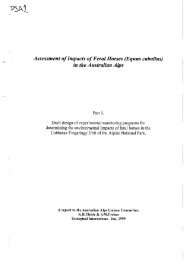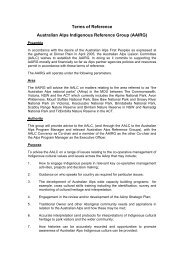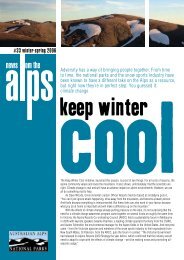Climate and weather of the Australian Alps
Climate and weather of the Australian Alps
Climate and weather of the Australian Alps
You also want an ePaper? Increase the reach of your titles
YUMPU automatically turns print PDFs into web optimized ePapers that Google loves.
CLIMATEAND WEATHERThe<strong>wea<strong>the</strong>r</strong> in<strong>the</strong> pastOver many millions <strong>of</strong> years, <strong>the</strong> climate <strong>of</strong> Australia has changed many times. Sixmillion years ago rainforest covered much <strong>of</strong> Australia, including <strong>the</strong> <strong>Alps</strong>. Three millionyears ago colder conditions with increased rainfall dominated. Vast cold, treeless plainsreplaced <strong>the</strong> rainforest vegetation <strong>and</strong> <strong>the</strong> alpine plants <strong>and</strong> animals started to colonise<strong>the</strong> area. In <strong>the</strong> last two million years <strong>the</strong> area was covered by ice several times. In <strong>the</strong>glacial periods, <strong>the</strong> species <strong>of</strong> plants <strong>and</strong> animals that could withst<strong>and</strong> <strong>the</strong> cold, spreadout over <strong>the</strong> l<strong>and</strong>. As <strong>the</strong>se periods ended, <strong>the</strong>se species retreated back to <strong>the</strong> only areawhere it was still cold – <strong>the</strong> <strong>Australian</strong> <strong>Alps</strong>. These plants <strong>and</strong> animals had special characteristics,which species today still demonstrate, to cope with <strong>the</strong> wide temperaturevariations. The last Ice Age ended only 10,000 years ago.<strong>Climate</strong>changeIncreases in temperatures around <strong>the</strong> world due to <strong>the</strong> greenhouse effect will have significantimpacts on <strong>the</strong> <strong>Australian</strong> <strong>Alps</strong>. The global average temperature has increasedby approximately 0.6 °C in <strong>the</strong> past 100 years <strong>and</strong> is predicted to continue to rise. Anaverage global warming <strong>of</strong> 0.7 to 2.5 °C is predicted by 2050 <strong>and</strong> 1.4 to 5.8 °C by 2100.<strong>Climate</strong> change may cause a dryer, hotter climate, less snow <strong>and</strong> more frequent <strong>and</strong> extremefire <strong>and</strong> <strong>wea<strong>the</strong>r</strong> events in <strong>the</strong> <strong>Australian</strong> <strong>Alps</strong>. Warmer temperatures that leng<strong>the</strong>nsummer, or result in warmer autumns <strong>and</strong> winters, mean less snow will fall. The bestcasescenario for snow is <strong>the</strong> least increase in temperature <strong>and</strong> <strong>the</strong> greatest increase inwinter precipitation. Even a modest warming <strong>of</strong> 0.6°C by 2050 will result in a reduction<strong>of</strong> 15 to 20 days <strong>of</strong> snow cover in <strong>the</strong> <strong>Australian</strong> <strong>Alps</strong>.The naturalGreenhouseEffect.Some <strong>of</strong> <strong>the</strong> sun’s radiationis reflected back into spaceby <strong>the</strong> atmosphere, clouds<strong>and</strong> <strong>the</strong> earth. 51% passesthrough <strong>the</strong> atmosphere <strong>and</strong>warms <strong>the</strong> earth’s surface.Some <strong>of</strong> this warmth escapesas infra-red radiation. Gasesin <strong>the</strong> atmosphere, like watervapour, Carbon Dioxide,Methane, Chlor<strong>of</strong>luorocarbons,Halons <strong>and</strong> NitrousOxide absorb <strong>and</strong> re-emitsome <strong>of</strong> <strong>the</strong> infra-red, effectivelywarming <strong>the</strong> loweratmosphere <strong>and</strong> earth byabout 35The enhancedGreenhouseEffect.An increase in <strong>the</strong>quantity <strong>of</strong> Greenhousegases as a result <strong>of</strong>human activity, mayincrease temperatures.EDUCATION RESOURCE CLIMATE AND WEATHER 4/7


